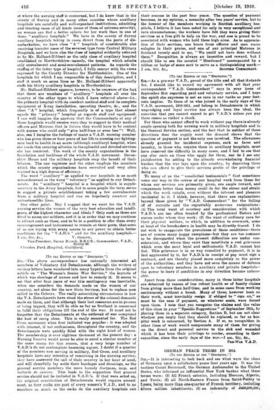[To THE EDITOR or THE " SPECTATOR.") Sts„ — As a pre-war
V.A.D., proud of the title and all that it stands for, I should like to record my agreement with all that your
correspondent " V.A.D. Commandant " says in your issue of September 21st regarding paid and voluntary service, and I hope the spirit she expresses is not as rare in our ranks as your foot- note implies. To those of us who joined in the early days of the V.A.D. movement, 1910-1911, and belong to Detachments in which ungrudging and loyal service has always been the ideal, the assertion that you cannot expect to get V.A.D.'s unless you pay them comes as rather a shock.
For those who cannot afford 'to work without pay there is already ample opening both for nursing work in military hospitals and in the General Service section, and the fact that in neither of these directions does the supply meet the demand shows that the question of payment is not the only one involved. The allowances already granted for incidental expenses, such as fares and laundry, to those who require them in auxiliary hospitals, must have removed the difficulty in many cases, and I fail to see that any slur rests on those who apply for them, nor do I see any justification for adding to the already overwhelming financial burden that the war lays upon the country, by depriving those who can afford to give their services gratis of the privilege of doing so.
To many of us the " unsolicited testimonials " that sometimes come our way in the course of our hospital work from those for whom our services are primarily given, are ample reward, and compensate better than money could do for the stress and strain which the work entails, even without the interest and pleasure incidental to it. I think, however, that there are explanations beyond those given by "V.A.D. Commandant" for the falling off of recruits and the regrettably numerous resignations : (1) The total want of courtesy and consideration with which V.A.D.'s are too often treated by the professional Sisters and nurses under whom they work; (2) the want of ordinary care for their physical welfare, to which, in addition to overwork, some at least of the breaks-down in health may be directly traced. I do not wish to exaggerate the prevalence of these conditions—there are of course many happy exceptions—but they are too common to be disregarded when the present difficulties are under con- sideration, and where they exist they constitute a real grievance which even the most loyal and enthusiastic V.A.D. cannot but feel. This grievance is in no way remedied by payment, it is in fact aggravated by it, for V.A.D.'s in receipt of pay must sign a contract, and are thereby placed more completely in the power of the authorities; and they have not even the means of defence open to 'voluntary members in auxiliary and private hospitals— the power to leave if conditions in any direction become unbear- able.
Apart from these considerations, many in these latter hospitals
are debarred by reason of less robust health or of family claims from giving more than half-time, and in some cases from -working continuously without a break. Many of these, however keen on their work, must inevitably resign if obliged to " sign on," as must be the case if payment, on whatever seals, were forced upon them. I note that you recognise the claims and the value of this class in your " Specific) Suggestions" of September 28th, by placing them in a separate category, Section B, but am not clear whether you imply that they should be replaced. so far as hos- pital work is concerned, by Section A. If so, no recognition in other lines of work would compensate many of them for giving up the direct and personal service to the sick and wounded which it has been their privilege to render, according to their capacities, since the early days of the war.—I am, Sir,
Pas-Was


































 Previous page
Previous page